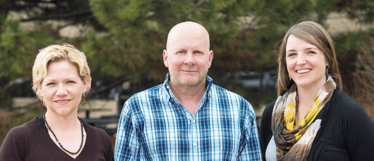The Cannabis Scientists of the Year 2018
In our February issue, we highlighted ten top scientists breaking new ground in chemistry, biomedical science and plant biology, as part of our annual round up of “The Year in Cannabis Science.” We asked you to vote for your favourites from our list, or suggest new names. Here are your picks for the top cannabis scientists of 2018.
1. Kent Hutchison, Cinnamon Bidwell and Angela Bryan
Co-Directors, CUChange Lab, University of Colorado Boulder, USA
The three co-directors of the CUChange Lab come from the departments of Behavioural Neuroscience (Hutchison), Cognitive Science (Bidwell) and Social Psychology (Bryan). The team focus on the complex mix of psychological, physiological and genetic factors that determine our behaviour around health and risk, especially when it comes to recreational drug use. This year, the CUChange Lab team were featured by publications including The Cannabis Scientist and Wired magazine with their mobile cannabis lab, housed in a converted Dodge/Mercedes Sprinter van. The team also made international headlines with a study suggesting that alcohol consumption, but not cannabis consumption, causes structural changes in the brain (1). The group will be expanding their cannabis research over the next few years, with several major new studies underway – including research on cannabis for chronic pain and recreational use of high-potency cannabis use (known as “dabbing”).

2. Chris Hudalla
Founder & Chief Scientific Officer, ProVerde Laboratories, Milford, Massachusetts, USA.
Hudalla’s extensive experience as an analytical scientist, including time at instrument giant Waters Corporation, has stood him in good stead over the past five years. Since establishing ProVerde Laboratories in 2013, he has been a lynchpin in efforts to tighten up safety testing in his home state of Massachusetts, and around the US. A member of several committees helping to set standards for cannabis testing, Hudalla works with others in the field to develop realistic testing protocols that ensure consumer safety. The team at ProVerde have also benefited from Hudalla’s contacts with instrument vendors, and now collaborate with a number of companies to help refine testing methods.

Hudalla says, “I’d been doing research in the industry and academia for 25 years when I left Waters to establish ProVerde. At the time, I believed the move would sever my ties with the professional scientific community. Ironically, it did exactly the opposite, and I garnered a lot of respect from my colleagues.”
3. Committee on the Health Effects of Marijuana, National Academies of Sciences, Engineering and Medicine
The committee, who published the most comprehensive review yet of the health impacts of cannabis and cannabinoids, was made up of 16 well respected scientists:
- Marie C McCormick (Chair), Sumner and Esther Feldberg Professor, Harvard T.H. Chan School of Public Health, Harvard University, Boston, Massachusetts, USA.
- Donald I Abrams, Professor of Clinical Medicine, University of California, San Francisco, And Chief of Hematology–Oncology Division, Zuckerberg San Francisco General Hospital, California, USA.
- Margarita Alegría, Professor, Departments of Medicine and Psychiatry, Harvard Medical School, and Chief, Disparities Research Unit, Massachusetts General Hospital, Boston, USA.
- William Checkley, Associate Professor of Medicine, International Health, and Biostatistics, Division of Pulmonary and Critical Care, Johns Hopkins University, Baltimore, Maryland, USA.
- R Lorraine Collins, Associate Dean for Research, School of Public Health and Health Professions and Professor, Department of Community Health and Health Behavior, State University of New York At Buffalo–South Campus, USA.
- Ziva D Cooper, Associate Professor of Clinical Neurobiology, Department of Psychiatry, Columbia University Medical Center, New York, New York, USA.
- Adre J Du Plessis, Director, Fetal Medicine Institute; Division Chief of Fetal and Transitional Medicine; and Director, Fetal Brain Program, Children’s National Health System, Washington, DC, USA.
- Sarah Feldstein Ewing, Professor, Department of Child and Adolescent Psychiatry, Oregon Health & Science University, Portland, USA.
- Sean Hennessy, Professor of Epidemiology and Professor of Systems Pharmacology and Translational Therapeutics, University of Pennsylvania Perelman School of Medicine, Philadelphia, USA.
- Kent Hutchison, Professor, Department of Psychology and Neuroscience and Director of Clinical Training, University of Colorado Boulder, USA.
- Norbert E Kaminski, Professor, Pharmacology and Toxicology, and Director, Institute for Integrative Toxicology, Michigan State University, East Lansing, USA.
- Sachin Patel, Associate Professor of Psychiatry and Behavioral Sciences, and of Molecular Physiology and Biophysics, and Director of the Division of Addiction Psychiatry, Vanderbilt University Medical Center, Nashville, Tennessee, USA.
- Daniele Piomelli, Professor, Anatomy and Neurobiology, School of Medicine and Louise Turner Arnold Chair in Neurosciences, Department of Anatomy and Neurobiology, University of California, Irvine, USA.
- Stephen Sidney, Director of Research Clinics, Division of Research, Kaiser Permanente Northern California, Oakland, USA.
- Robert B Wallace, Irene Ensminger Stecher Professor of Epidemiology and Internal Medicine, Department of Epidemiology, University of Iowa Colleges of Public Health and Medicine, Iowa City, USA.
- John Wiley Williams, Professor of Medicine, Duke University Medical Center, Durham, North Carolina, USA.
Between them, the scientists reviewed 10,000 studies and compiled their findings into a report – a balanced view on the harms and potential benefits of cannabis use and misuse, entitled “The Health Effects of Cannabis and Cannabinoids: the Current State of Evidence and Recommendations for Research.”
Based on their research, the members of the committee strongly recommend additional research in a number of areas. In the report, the scientists wrote, “This is a pivotal time in the world of cannabis policy and research. Shifting public sentiment, conflicting and impeded scientific research, and legislative battles have fueled the debate about what, if any, harms or benefits can be attributed to the use of cannabis or its derivatives.”












